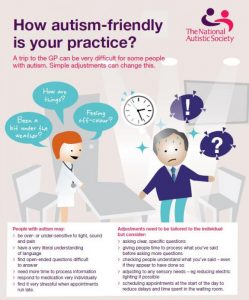
Dr Ava Ruth Baker
20 March 2017 – Ava Ruth Baker (MB ChB Dip Health Sci – Mental Health) has experienced autistic healthcare ‘from both sides of the desk’ – as an autistic adult, parent, and a medical practitioner now specialising in autism and mental health, after decades as a GP. Among her other autism work, she offers training workshops on ‘autism-friendly healthcare’ for medical practices. She is on the board of the ASK Trust and can be contacted via
Do you dread or avoid visits to your GP, hospital, dentist or other health provider? Research is finally confirming what many of us have long known, that there are major barriers to good healthcare for autistic patients compared to the general population (Nicolaidis et al, 2013).
The New Zealand Autism Spectrum Guideline acknowledges this disparity, and recommends all health providers upskill and adapt their practice to autistic needs -but stops short of practical ‘how to’ resources to enable this. Health providers so far show limited interest in taking up opportunities to upskill, and though licensing bodies such as the NZ Medical Council now expect practitioners to demonstrate ’cultural competence’ and to accommodate ‘health literacy’ issues, offering incentives to attend courses in the needs of ethnic communities, this has not been extended to the needs of the neurodiverse community.
The focus of this article is on ideas and resources that you – autistic adults, parents and support persons – could use in the meantime to ease your own healthcare encounters, and in the process to help educate health providers about autistic needs.
Academic Autism Spectrum Partnership in Research and Education
Exciting insights and solutions are emerging from the work of AASPIRE, the USA-based ‘Academic Autism Spectrum Partnership in Research and Education.’ Through their ‘co-research’ approach (see our article on Autism-friendly research), AASPIRE have completed a series of studies exposing and exploring this disparity, then developing and evaluating a ‘healthcare toolkit’ to address that. The toolkit itself, as well as academic articles detailing their research, is freely available from their website http://aaspire.org.
“Autistic adults face many challenges when trying to access healthcare services, including locating disability-competent providers, understanding and navigating the health system, and obtaining the necessary accommodations for their communication, cognitive, emotional regulation, and sensory needs. We developed tools to help autistic people and their healthcare providers address these challenges.” (Nicolaidis et al, 2016).
The AASPIRE Healthcare Toolkit has one section for patients and supporters, and another for healthcare providers, providing a comprehensive range of downloadable healthcare and autism-related information, checklists, worksheets, and other resources.
For autistic patients and their support persons, these include:
- ‘AHAT’ (Autism Healthcare Accommodations Tool) – an interactive computerised survey that generates your own customised accommodations report to give your health provider
- ‘Symptoms’ worksheet outlining the types of questions healthcare providers are likely to ask you about your symptoms, to help you prepare for your visit beforehand; and other worksheets for ‘What to bring to a visit’; ‘Making an appointment’ and ‘After the visit’.
- information on your rights in healthcare
This toolkit has been already found to help autistic users “clarify and communicate their needs … self-advocate and prepare for visits more effectively, and positively influence provider behaviour.” It also helped users “name the challenges they experience with healthcare, and understand them as issues commonly experienced by others on the spectrum … [reframing them] not as personal weaknesses, but as disability-related needs that can and should be accommodated.” (Nicolaidis et al, 2016). Although their toolkit was developed for use in general practice / primary care, it’s been found useful in other healthcare setting too.
“This type of patient empowerment appeared to be particularly helpful when combined with practical resources and tools that participants could use to prepare for visits or for following recommendations …. But patient empowerment must be coupled with changes in provider attitudes, skills, and behaviours” (Nicolaidis et al, 2016).
Other supports for healthcare encounters
Meanwhile in New Zealand, Autism Spectrum Kiwis (ASK) Trust has made our own compilation of international and local healthcare resources, to support your healthcare encounters, with tips and links, including some suitable for autistic children, for autistic adults with limited understanding of basic health matters, and for use in other healthcare settings such as hospitals, dental offices, or when preparing for specific procedures such as blood tests. This can be downloaded from http://www.asknz.net/uploads/2/9/3/7/2937986/healthcare_visits_for_autistic_patients.pdf
Tips for your practitioner on effective ways of communicating with us: consider giving your practitioner one of the following, written by autistic adults
- What I Wish My Doctor Knew About Me as a Person on the Autism Spectru
m (Aspie). www.DevelopmentalMedicine.ucsf.edu (author anonymous)
- Communicating Better with People on the Autism Spectrum by Paddy-Joe Moran (available as paperback or kindle book)
Or supply your practice with one of these autism-friendly healthcare posters, freely downloadable from http://journals.rcni.com/page/ns/resources/posters/autism-poster
Or ‘How autism-friendly is your practice?’ poster from http://www.autism.org.uk/professionals/health-workers/gp-info.aspx
Other resources for health providers
Besides the above, Autism CRC has compiled on their ‘Health Hub’ a list of links to autism information for health providers – see http://www.autismcrc.com.au/online-tools-health-professionals
References
Nicolaidis et al (2013). Comparison of healthcare experiences in autistic and non-autistics adults: a cross-sectional online survey facilitated by an academic-community partnership. Journal of General Internal Medicine, 28(6), 761–769
Nicolaidis et al (2016). The Development and Evaluation of an Online Healthcare Toolkit for Autistic Adults and their Primary Care Providers. J Gen Intern Med © Society of General Internal Medicine 2016; DOI: 10.1007/s11606-016-3763-6
This article was first published in Altogether Autism Journal Issue 1, 2017 read the latest edition.



